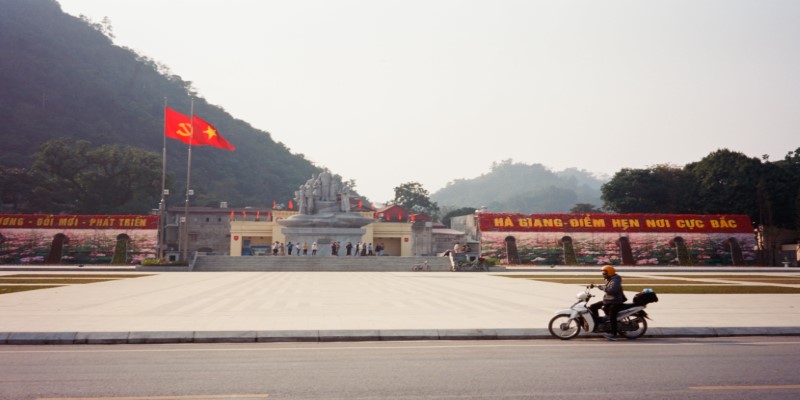Discover the history and principles of communism in simple terms. Explore the roots of this ideology, its key principles, and how it has shaped societies. Communism is a political and economic ideology that has shaped societies and sparked debates for decades. In this article, we'll break down the basics of communism in simple terms to make it easy for everyone to grasp. Let’s begin.
What is Communism?

At its core, communism is an idea that advocates for a classless and stateless society. It envisions a world where the means of production, such as factories and farms, are collectively owned and controlled by the community as a whole.
In more straightforward terms, communism involves collective ownership, where there are no personal proprietors. The origins of communism can be linked to the writings of Karl Marx and Friedrich Engels in the mid-1800s. They conceived communism as a solution to the societal disparities and exploitation that were widespread during the industrial revolution.
What are the Key Principles of Communism?
Communism is built on several key principles that outline its vision for a society without classes and a state. Let's break down these principles in simple terms:
Common Ownership:
Communism says that everyone should own things like factories and farms together. In simpler terms, nobody owns these things individually; it's a shared ownership where there are no single owners or capitalists.
Classless Society:
Communism aims to get rid of social classes. In a communist society, there's no difference between rich and poor. People pitch in based on what they can do, and everyone gets what they need.
Statelessness:
Communism imagines a society without a government where there's no need for rules or someone in charge. Instead, people are supposed to govern themselves and collaborate for the greater good.
Abolition of Private Property:
Communism wants to get rid of private ownership of big things like factories and resources. It's not about your personal stuff, like your toothbrush; it's about sharing the important things that can create economic inequality.
Equality:
In communism, equality is a big deal. It's not just about money; it's also about treating everyone the same socially and politically. Communism wants a society where everyone has the same chances, and nobody is left out or treated unfairly.
Collective Decision-Making:
In communism, the community makes decisions together instead of one person or group having all the say. This way, the needs and wishes of the whole community are considered.
Social Justice:
Communism wants to fix past wrongs and make a system that's fair for everyone. This means sharing wealth and resources more equally to make things right when there are existing inequalities.
Why Did Communism Fail?
The failure of communism is a complex and debated topic, but let's break it down in simple terms. Communism faced several challenges that contributed to its struggles and ultimate failures in various countries. Here are a few key reasons:
Centralized Control:
In some places that tried communism, they went for a strong central government. This meant a lot of power in one place, which usually turned into a bossy kind of rule. This ended up squashing individual freedoms and creativity. Instead of having no classes, a new group in charge appeared, making things unequal and causing unhappiness.
Economic Issues:
Communism, with its idea of everyone owning stuff together, didn't always work smoothly. When the planning was all in one place, instead of letting markets figure things out, it caused problems like not having enough of some things or having too much of others. This lack of flexibility and innovation made the economy slow down, and people weren't too happy about it.
Lack of Incentives:
Without people owning stuff privately and the idea of making money for themselves, communism faced a challenge. It was hard to get folks excited to work really hard and come up with new ideas. Some said that without the chance to earn things for themselves, there wasn't enough reason for people to do their best at work.
International Pressures:
Back in the Cold War, there was a big fight of ideas between communist and capitalist countries. This caused a lot of problems and tensions between them. Communist states faced things like economic punishments, being left out, and tough competition with countries that followed capitalism. All of this made it really hard for the communist states to do well.
Cultural and Social Challenges:
Communist ideas didn't always match up with how people already thought and lived. When they tried to push these ideas too hard, it often caused problems. People didn't like being told what to do, and there was a big gap between what the government wanted and what the people believed in. This clash created resistance and made it tough for the government to connect with the folks.
What is the Difference Between Communism and Socialism?

Communism and socialism are often used interchangeably, but they have distinct differences. Let me break it down for you in simple terms:
Communism:
Communism takes socialism to the next level—it's like the more extreme and dreamier version. In a communist setup, they want a world without a government, social classes, and money. Everything is owned by everyone together, and there's no private property. The idea is that people will work for the greater good without needing a government to tell them. Karl Marx, one of the folks behind communism, saw it as the ultimate stage in how societies develop.
Socialism:
Now, socialism is a bit different. It's a bigger concept with different meanings. In a socialist setup, things like factories and farms can be owned by the government or the community. Unlike communism, socialism doesn't completely get rid of private property, and there might still be a government managing the economy. The aim of socialism is to lessen economic inequality and make sure everyone can get things like education, healthcare, and jobs.
Think of communism as the final goal of socialism. Socialism is like a steppingstone toward communism, where the government is more involved in running the economy and making things fair. The big difference comes down to how much control the government has, what happens with private property, and the ultimate picture of the society they're aiming for.
Conclusion
Communism, at its core, is like a dream of a society where everyone is equal and works together. Even though it's been tough to put into practice, knowing the main ideas helps us understand the big goals that have influenced politics and history. Simply put, communism is about sharing, fairness, and imagining a world where everyone has what they need.



